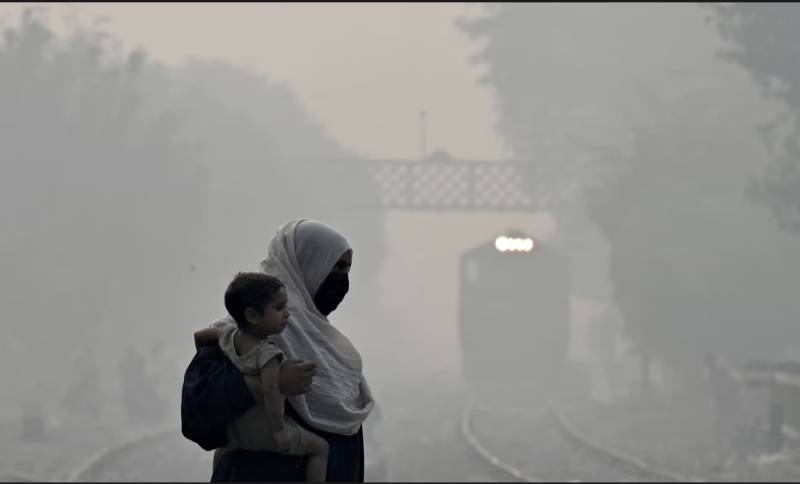
Pakistan is currently fighting with one of its most urgent challenges; increasing environmental threats and climate change. In rural and urban areas where people directly rely on natural resources, unpredictable monsoon patterns, rising temperatures in the summer, hazardous smog in winter, melting of glaciers, and worsening droughts and floods all have a substantial detrimental impacts on agriculture, public health, and water security.
Despite contributing less than 1% of the world’s greenhouse gas emissions, it is among the top ten countries most affected by climate change. Currently, large parts of central Pakistan are suffering from the annual crisis of smog which has detrimental effects on the environment, public health, and commercial activities, particularly in Punjab’s major regions like Lahore, Faisalabad, and Multan. Smog is a toxic concoction of dust, industrial emissions, vehicle emissions, and crop burning that is made worse by temperature inversions that trap pollutants near the ground during the winter. Apart from reducing life expectancy and escalating respiratory ailments, this current epidemic has highlighted the necessity of green policies and political action to address air quality concerns.
In Pakistan, air pollution has become a constant concern rather than a seasonal one. The worldwide Air Quality Index (AQI) scale states that an index value of 300 or more is "Hazardous" to human health, but Pakistan frequently features scores far greater than that, rising close to 1,000. The 13 million people who live in Lahore have been coughing for a week now; this month, the air quality index has routinely surpassed 1,000. The AQI level in Multan, another metropolis with millions of inhabitants, surpassed 2,000 in the last week, which is 18.4 times the World Health Organization (WHO) recommendations. This is a startling height that the shocked locals have never witnessed before.
The University of Chicago's Air Quality Life Index states that fine particulate matter (PM2.5) lowers the average life expectancy of Pakistanis by about four years, with inhabitants in Punjab's worst polluted districts perhaps losing up to seven years. Over 98% of Pakistanis breathe air that is over national air quality guidelines nationwide, mostly as a result of high sulfur fuels, unregulated vehicle emissions, and inadequate waste treatment infrastructure.
The WHO states that heart disease, strokes, lung cancer, and other respiratory disorders can all be brought on by air pollution. It is particularly hard on old people, newborns, and small children. This urgency is driving the country's green political movement, which promotes more resilient climate policy, environmental justice, and sustainable development.
Many companies disregard pollution control regulations, in part because there are lax penalties and in part because of economic incentives that put expansion ahead of environmental sustainability. Furthermore, even if green political movements are gaining traction, industrial lobbyists continue to oppose them, and they have trouble reaching low-income and rural areas
A crucial answer to these problems is green politics in which politicians push for extensive reforms to reduce pollution. A glaring step toward green policies in Pakistan was taken by the Ministry of Climate Change in 2023, by introducing The National Clean Air Policy to address pollution in industry, transportation, and agriculture over the next decade.
In response to the intense air pollution, the Punjab government has implemented emergency measures such as temporary school closures, fines for smoke-emitting vehicles, the closure of some factories, and a call for people to stay indoors and stay at home as part of the so-called "green lockdown," which has also seen the prohibition of heavy vehicles, motorbike rickshaws, and motorbike parking in high-traffic areas. However, the limited impact and inconsistent nature of these temporary fixes have led to criticism.
Beyond its negative effects on health, pollution harms crops, lowering agricultural output and lowering livelihoods, especially in rural areas. According to estimates from the World Bank, the GDP of Pakistan is expected to decline by at least 18-20% by 2025 as a result of combined hazards caused by catastrophic climate-related events such as environmental degradation and air pollution. This will impede efforts to reduce poverty and advance economic development.
It is pertinent to mention that Pakistan has taken several important actions to solve these environmental issues. It started implementing Euro-5 fuel requirements in 2021 to lower the amount of sulfur in gasoline and diesel, which lowers emissions. Pakistan has also partnered with organisations like USAID and the Green Climate Fund (GCF) to acquire foreign funds. The "Billion Tree Tsunami" programme is one such effort that uses forests to reduce flood hazards, improve air quality and restore biodiversity. With collaborations like the USAID-led Pakistan Climate Financing Activity and Green Climate Fund investments aimed at projects that lower the risks of floods and drought throughout the Indus Basin, foreign assistance has been crucial in the interim.
In addition, the government has set aggressive goals under the Paris Agreement, including electrifying 30% of its transportation sector and reaching 60% renewable energy by 2030.
Despite these initiatives, Pakistan still has trouble implementing environmental laws because of political unrest, institutional weakness, and economic limitations. Many companies disregard pollution control regulations, in part because there are lax penalties and in part because of economic incentives that put expansion ahead of environmental sustainability. Furthermore, even if green political movements are gaining traction, industrial lobbyists continue to oppose them, and they have trouble reaching low-income and rural areas.
We must move swiftly and together to address climate change and green politics is crucial to guaranteeing a sustainable future. Pakistan has a chance to combat present environmental problems and build a more resilient economy that can survive the effects of climate change. By promoting sustainable climate policy and elevating the voices of activists it can safeguard its people and ecosystem and set an example for resilient and environmental stewardship throughout South Asia. For Pakistan, addressing climate change is not a choice, it is a need.

